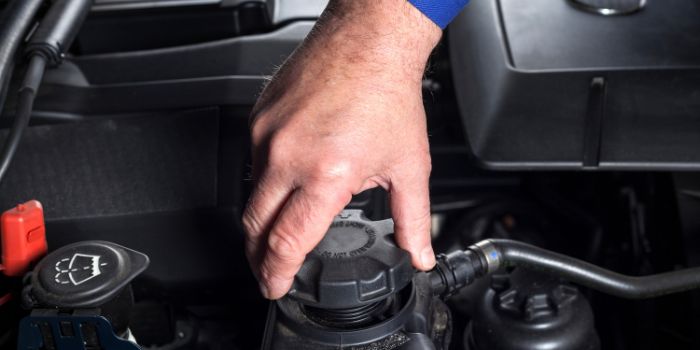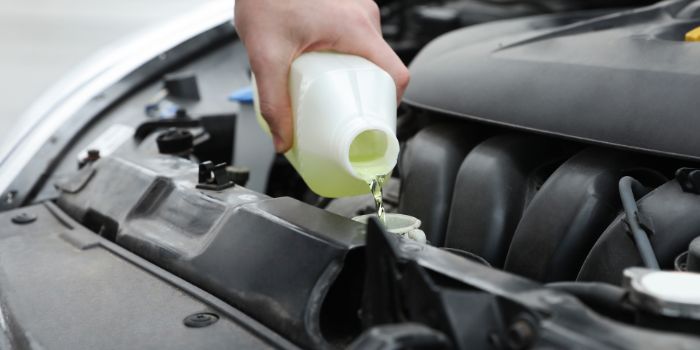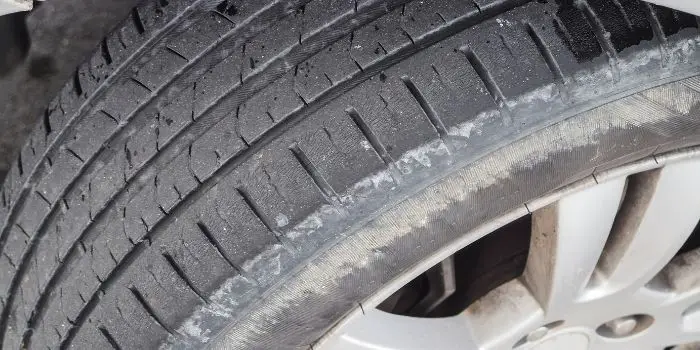
Coolant is a mixture of water and antifreeze. It circulates through the engine to keep it cool.
Antifreeze is basically a chemical added to the coolant to lower the freezing point.
This prevents the coolant from freezing in cold weather and protects the engine from overheating in hot weather.
Antifreeze also contains corrosion inhibitors to protect engine parts from corrosion.
With that said, car coolant and antifreeze are hazardous materials, so it’s important to handle them and dispose of them properly.
In this post, we’ll discuss the best way to dispose of car coolant and antifreeze.
We’ll also talk about some of the dangers associated with these materials. Thanks for reading!
Table of Contents
How do You Dispose of Car Coolant and Antifreeze?
The best way to dispose of car coolant and antifreeze is to take it to a certified recycling center.
Many automotive stores have programs to recycle used coolant and antifreeze.
You can also check with your local government to see if there are any special disposal requirements in your area.
Step 1- Test the Antifreeze Levels in Your Car
The first step is to test the antifreeze levels in your car. You can do this by using a hydrometer or an electronic tester.
If the antifreeze levels are low, you will need to add more coolant to your car.
Step 2- Drain the Coolant from Your Car
Once you have added enough coolant to your car, you will need to drain the old coolant from your car.
To do this, locate the drain plug at the bottom of the radiator and remove it. Once the plug is removed, the coolant will begin to drain out.
You may want to place a pan under the radiator to collect the old coolant.
Step 3- Dispose of the Old Coolant Properly
After you have drained out the old coolant, you will need to dispose of it properly.
There are a few different options for proper disposal, including taking it to a recycling center or using a product like EcoSmart to neutralize and recycle the coolant.
EcoSmart is a safe and effective way to dispose of your old coolant.
It is made with natural ingredients that neutralize the toxins in the coolant, making it safe for the environment.
Once the coolant has been recycled, you can then use it again in your car.
By following these steps, you can safely and effectively dispose of your car’s coolant. This will help protect the environment and keep you and your family safe.
Step 4- Secure the Antifreeze Liquid and Transport It Safely
To securely transport the antifreeze liquid and dispose of it safely, you will need to use a container with a tight lid.
Once you have your container filled with liquid coolant, be sure to carefully transport it to a hazardous waste or recycling center.
You may want to get in touch with your local government or environmental agency for recommendations on safe and reliable disposal facilities in your area.
Step 5- Pour the New Antifreeze into Your Car
You will need to add the new antifreeze to your car.
You can find the right kind of antifreeze for your car at most auto parts stores.
Be sure to follow the instructions on the package when adding the new antifreeze to your car.
Step 6- Check the Antifreeze Levels in Your Car Regularly
It is important to check the antifreeze levels in your car regularly. You can do this by using a hydrometer or an electronic tester.
If the levels are low, you will need to add more antifreeze to your car.
By following these steps, you can safely and effectively dispose of your car’s coolant.
This will help protect the environment and keep you and your family safe.

Dangers of Car Coolant
There are many dangers associated with antifreeze.
The most serious danger is that it can be toxic if swallowed. Even a small amount of antifreeze can be deadly to humans and animals.
Another danger of antifreeze is that it can cause fires and explosions. The vapors from antifreeze are flammable, and the chemicals in antifreeze can react violently with other substances. This can lead to serious accidents and injuries.
Antifreeze is also a major environmental hazard, as it can pollute soil and water.
Symptoms of antifreeze poisoning include vomiting, diarrhea, seizures, and coma. Antifreeze can also cause severe burns if it comes into contact with the skin.
Can Antifreeze be Recycled?
Yes, antifreeze can be recycled. Many automotive stores have programs to recycle used antifreeze, so you may be able to drop it off there.
You can also check with your local government to see if there are any special disposal requirements in your area.
How to Clean Up Old Antifreeze Spills?
There are a few different methods you can use to clean up old antifreeze spills.
The first step is to make sure that the area is well-ventilated, and wear protective clothing such as gloves, goggles, and a face mask when working with antifreeze.
You should also contain the spill by placing an absorbent material such as cat litter, sand, or clay over the spill and letting it sit for several hours to absorb the antifreeze.
Once the area is dry, you can sweep up the spill and dispose of it safely in a sealed container.
Another option is to use a commercial cleaner designed specifically for cleaning up antifreeze spills.
If you use this method, be sure to follow the instructions carefully and dispose of the cleaner properly when you’re finished.
Why You Should not Pour Antifreeze Down the Sink?
Pouring antifreeze down the sink can pollute the environment and is dangerous to people and animals.
It can also be harmful to the sewage treatment process, and pouring antifreeze down the sink can contaminate groundwater and drinking water.
When is Used Antifreeze not Considered Hazardous Waste?
Used antifreeze is considered hazardous waste if it is mixed with other hazardous materials, such as oil or cleaners.
However, if the used antifreeze is not mixed with other materials, it may not be considered hazardous waste.
FAQS
Can you reuse your old engine coolant?
Yes, you can reuse your old engine coolant as long as it is still in good condition.
You should check the coolant level and color regularly, and add water or coolant as needed.
If the coolant becomes discolored or dirty, it should be replaced.
How often should I change my car’s coolant?
There is no one-size-fits-all answer to this question, as factors like driving conditions and vehicle age can affect how often you need to change your car’s coolant.
Generally speaking, however, most experts recommend changing your car’s coolant every 6 months or 5,000 miles to maintain optimal performance and avoid issues with corrosion and overheating.
It’s also a good idea to check the coolant level regularly and top it up as needed.
If you are unsure about how often you should change your car’s coolant, it is best to consult with a trusted mechanic or automotive expert who can provide personalized recommendations based on your specific needs and driving habits.
With proper maintenance and care, your car’s coolant should last for many years without issue.
Can You Dump Antifreeze on The Ground – how long does it stay there?
The short answer is that it depends on a number of factors, including the type of ground and soil conditions in your area.
Generally speaking, antifreeze can stay in the ground for several months or even years before being absorbed or broken down by the soil.
However, this process can be accelerated by heavy rainfall or other environmental factors, and there may also be local regulations and restrictions that limit or prohibit the dumping of antifreeze on the ground.

Based in Orem (Utah) John Paterson graduated from Utah Valley University and has begun writing in 2009. He has a large wealth of experience in writing articles related to cars, automotive repair, wheels, cleaning/maintenance, and much more. He has also written instructional articles in a similar niche for a few online publications as well. Currently, he works as a mechanic in his personal garage shop where he loves serving his countrymen from his heart.




